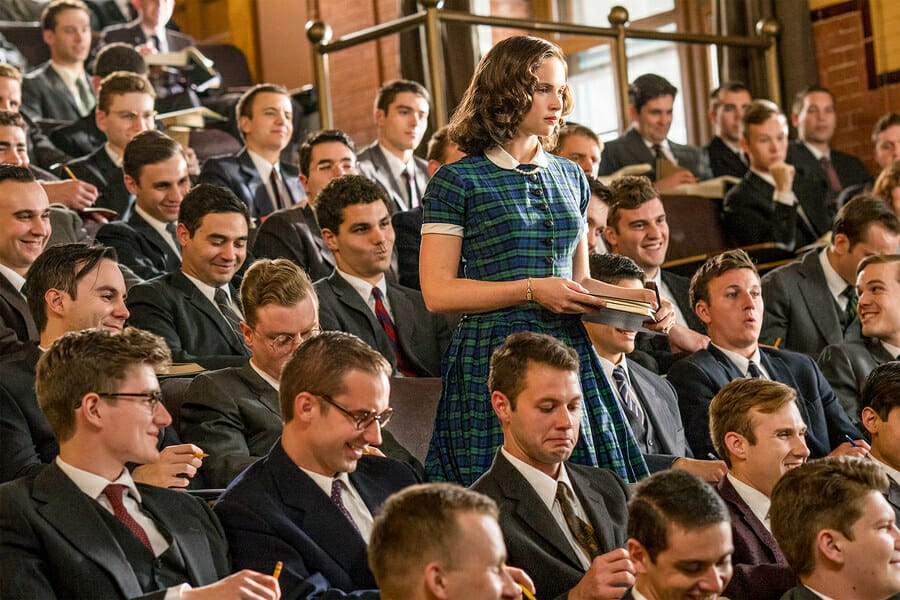
‘On the Basis of Sex’ Review
Earlier this year, the documentary RBG (co-directed by Julie Cohen and Betsy West) was a film festival and box office hit, helping turn 85-year-old Supreme Court Justice Ruth Bader Ginsburg into a celebrity and cult icon, complete with best-selling “Notorious RBG” t-shirts and her own action figure. That documentary allowed us the rare opportunity to hear directly from a currently sitting Justice, and just about every viewer came away in awe – regardless of one’s political affiliations. Now, a few months later, we get the story of her younger years in a (loving) script written by Ms. Ginsburg’s nephew Daniel Steipleman.
On the Basis of Sex opens with a lone woman in a dress engulfed by a sea of young men in conservative business suits marching up the steps on day one of Harvard Law School in 1956. Inside the oak-paneled hall, the school’s dean, Erwin Griswold (Sam Waterston) discusses what it means to be a ‘Harvard man’ and how this is only the sixth year that women have been admitted. As he speaks, young Ruth (Felicity Jones) glances around the room at the (only) 8 other female students. At a later reception for the females, Dean Griswold asks each to stand and explain why they are worthy of taking a man’s spot in the class. It’s our first (not last) example of the sexism obstacles of the time – much different than those of today, where women procure more higher education slots than men.
By this time, Ruth and Martin Ginsburg (Armie Hammer) are both Columbia graduates, have been married for a couple of years, and are raising their first child, Jane. When Martin is diagnosed with testicular cancer, Ruth covers his classes and hers is mother to young Jane, and also a caregiver to a recovering Martin. Of course, her husband recovers and goes on to be a highly successful tax attorney on Wall Street, and their marriage continues until his death in 2010.
But this is Ruth’s story, and her strength is on display. As uplifting as it is to see that Martin was an immensely supportive husband, it’s deflating to see how a brilliant woman – number one in her class – is so disrespected during this era that she can’t even find a job at a law firm. For one committed to doing, Ruth accepts a job teaching instead. Her time as a professor at Columbia is spent encouraging students to explore the inequities of the law when it comes to men and women. In fact, it’s 1970 when Ruth and Marty work their only case together. A Colorado man, Charles Moritz (Chris Mulkey), is denied a tax deduction for the caregiver expenses in caring for his sick mother. By law, the deduction is only allowed for female caregivers, and this gives Ruth her first taste of ‘doing.’
It’s at this point, where Kathy Bates appears as civil liberties lawyer Dorothy Kenyon, and Justin Theroux as Mel Wulf, the ACLU Legal Director. Adding spice to Ruth’s and Marty’s life is their teenage daughter Jane (a very good Cailee Spaeny) who is quite headstrong in her own beliefs. The scenes in the Appellate Court are the film’s best, as is the Moot Court sequence – though we do wish more time had been devoted to the prep work and details for the court arguments.
Director Mimi Leder is known mostly for her TV work, and she delivers the story of an amazing woman in an easily accessible manner for mass audiences. It’s an approach that will hopefully allow many young people (yes, especially women) to gain a better understanding of what this woman went through and fought for during the decades before she became the second woman to serve on the US Supreme Court. Two takeaways here are that Ruth Ginsburg is a superhero and pioneer of social change, and also that a marriage of equal partners carries great power. Her cameo as the film’s final shot leaves no doubt that RBG is no longer concerned about which dress will make her look like a “Harvard man.”

